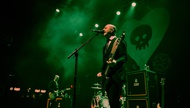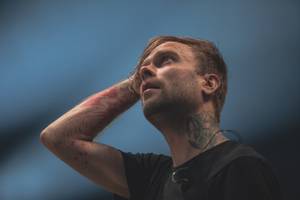Those bemoaning The War on Drugs’ absence from the Las Vegas concert calendar might not know the Philadelphia band once played the Beauty Bar early in its career, supporting The Hold Steady back in 2009. Nine years later, after 2014 breakout album Lost in the Dream and last year’s A Deeper Understanding (which won Best Rock Album at the Grammys earlier this year), the sextet led by frontman and primary songwriter Adam Granduciel returns for a Coachella-overlap show at Brooklyn Bowl. We rang bassist and founding member Dave Hartley during some brief downtime.
Do you recall anything memorable about that Beauty Bar show here? Gosh, that was so long ago—sort of a pretty formative tour for the band. It was the first time we did some serious road work—long drives, chasing The Hold Steady in their bus and no one knew us. I remember us getting to Las Vegas … Adam had all the money we made on tour, and he said, “Don’t let me have this until we leave Vegas!” He was scared we’d walk up to a blackjack table and plop it down. We did some stereotypical Vegas stuff where we gambled a bit and stayed at a casino. I remember the bellhop bringing our stuff down from the casino, [saying] we wouldn’t fit it all into our minivan … we proceeded to Tetris it all in the van, and his mind was blown.
I remember the show was fun, and it was beautiful weather. It’s crazy we’re coming back nine years later. It’s long overdue, and we’re excited.
This time you’re playing in a 2,200-capacity venue ahead of two performances at Coachella. How important are these smaller headlining shows to you during festival season? I think the side shows or smaller shows feel more real to us. The festivals are important and challenging. When you play a festival you’re part of this melting pot of bands, and people pay the ticket price for the experience and getting drunk in a field with friends. But when we play Vegas and Tucson, people are paying to see us. It’s more eyeball to eyeball with the fans. Not to downplay festivals, but they feel a little competitive, all these bands competing for the attention of an audience, whereas the club and theater shows are more intimate, and you’re trying to build a bridge with these people you haven’t seen for eight or nine years. It’s a unique opportunity to connect with people.
For A Deeper Understanding, Adam wanted to really highlight the individual musicians’ contributions—especially yours. Was that gratifying to hear? Oh yeah. To be honest, it was really gratifying. I’ve always tried to take the craft of being bass player very seriously ... I just love it and I want to be good at it, and pay homage to all the other great bass players.
Part of it was that [with] the records before—and this wasn’t [Adam’s] doing, maybe the people he was working with—the bass was kind of pushed out of the mix a bit. I think we would often listen to ’70s records like from golden era of analog recording, and the bass is super-prominent in those recordings and sounds so good. We asked, why don’t people do that anymore? Modern records have become a little more bass-y in a frequency sense because they add low end, but it’s compressed; it’s unarticulated a lot more than back in the day. You put on a Fleetwood Mac record, even on your cell phone speakers, and you can hear the bass; it’s really present in the mix. But on some older War on Drugs records, you put them on and you hear the bass more from the kick drum or the synthesizers.
It was cool he said, “Hey man, I like your playing.” We’ve been playing together for so long.
When he told me that, I said, sh*t, that’s a complement and flattering, but also, you gotta rise to the occasion. At the beginning of working on that record, I started taking bass lessons again, even though I’d been playing for 35 years. I found a jazz virtuoso in Philadelphia ... I wanted to be humbled a little bit and went back to school, and gained a new perspective on playing. I’ve forgotten a lot of it since, but just approaching it, putting it in my brain and stirring up the stew has expanded my palette a bit.
It’s definitely noticeable on the record, especially on “Strangest Thing.” In fact, you’ve got more going on during that song than the others. Did the complexity of the song require you to play a bigger role? I have to give credit where credit is due. The hooky bassline was Adam’s idea. And he played the bass on the first verse. That’s why it sounds like it’s getting louder. He was demoing it for me to learn, and we went along and I said, “You should just use that bassline.” Adam’s an interesting bass player in his own right and just a great musician. He played that first scratch bass, and then I came in, taking it into the new place. Some of the other bass hooks were Adam’s ideas. So he was thinking of things in terms of the bass when it came to the arrangements, and it was challenging to play someone else’s ideas for the bass hook. It took some woodshedding for me to do it the right way, the way it would satisfy his ear.
And [with] that song I did some other things, some acoustic guitar stuff and some vocal stuff. It was cool. He kind of welcomed me and the whole band into the process of making the record in a pretty awesome way. On the other records, he’d bring us in and asked us to play on the track, and he’d play a song you’d never heard before and give you one or two passes on it—and that was the song that was recorded. ... I think there’s something interesting with the tentative way which you play when you hear it for the first time. But it was nice that, as we got further along in our career, he was like, “Hey, wanna learn the song? Here’s a demo.” So when we came in, [drummer] Charlie [Hall] had ideas and [keyboardist] Robbie [Bennett] had ideas. He was really cool to say, “This is a band, even though it’s my thing.” He made you feel like you were participating.
The band has artistically evolved since its debut, Wagonwheel Blues. How has your bass playing had to change along with the songwriting and compositions? I think it happens naturally. When you’re in a band together and travel around and live in the same neighborhood and grow older with your bandmates, you sorta change together, you know? When we started playing together, we were young 20-somethings and now we’re pushing 40. Everything about your life changes in that span of time—your lifestyle, your mind, your musical tastes evolve and crystalize. A lot of what Adam as done in his career is taking a blurry image and focusing it over many albums. And there was something cool about that blurry image, and there’s something cool about it coming into focus.
I think I’ve become a better player and musician just through listening to music over time, and appreciating something simple and something virtuosic and everything in between. It does stem from Adam’s evolving songwriting because it really changed over time.
The War on Drugs played nearly 300 shows supporting Lost in the Dream, and I’m sure the touring for A Deeper Understanding will be comparable. That has to make a band play better over time, right? Oh yeah, big time. It’s really cool to go from “How do we play these songs?”—like “Eyes of the Wind,” where we were like, “What are the chords? What is the arrangement?”—and now it’s like we’re trying to get into a deep hypnotic zone where the song can have pretty tremendous dynamics, and let it take you somewhere that night. Doesn’t happen all the time, but there are nights where we are like, damn, we’re playing with one another and we have a mind melt of a hive mind to play as one entity and [we’re] following the subliminal and subtle cues we give one another. It’s a fun challenge. Also, on individual level, we all think we’re improving. If you don’t, I mean, what’s the point? That’s the human condition.
You’ve been the lone remaining original member aside from Adam. Why have you remained so committed to the band? I guess it’s luck and friendship. Luck in a sense that I was at a music crossroads and met Adam when I was 26, and just kind of latched onto this level of authenticity I hadn’t experienced in my musical endeavors at that point. It was luck to meet him at that time. We’re just friends, outside of music, and we support one another. We don’t fight about it; there’s no power struggle. It feels like the band as it is right now, we all have that dynamic; it goes across the board. … We’re really good friends, and in a band, I’m aware that’s fortuitous and an unusual place to be.
Last year was a busy one for you, as the War on Drugs released A Deeper Understanding, and your other band, Nightlands, also released an album. When you throw in gigs for both bands, did you worry about putting too much on your plate? Not really. I don’t have a day job, and I don’t have a kid yet, though I will soon. War on Drugs is an on and off switch; there’s pretty significant downtime for people to live their lives. But I can’t just switch off music. I have to make records … for anyone who cares. It’s for myself; that’s my job. Nightlands is my passion project. When the Drugs wheel gears stop turning, the Nightlands’ wheels kick in. I don’t do a tun of Nightlands gigs, but I make them count. It’s not that hard to balance. And Adam and the dudes are really cool to support me and allow me time and space to do [Nightlands].
Do your different musical endeavors complement one another in any way? I’m sure there is, although I think they complement each other in a puzzle piece or yin/yang kind of way. Nightlands tickles a lot of nerves that don’t get tickled in my other band. And War on Drugs is sort of this team that has this charismatic, strong-willed leader. It’s unequivocally Adam’s band, and the rest of us fall in line to support his vision, and gladly. When I come home, I feel subconsciously I’ve learned a bunch of stuff from osmosis and the various musicalities of my bandmates, and they sort of express themselves in Nightlands. But there’s also like, hey, now it’s my turn to make artistic decisions on an album and run the ship myself, instead of being someone who’s helping the ship run smoothly.
When I’m home and toiling on my own record, it makes me miss being in War on Drugs. Each one leads to the other. And luckily, I’ve always had plenty of time to do both. That may change one day, but I’ve never felt rushed to make a Nightlands record or eager to end a War on Drugs tour—I’m always happy to be doing it. Everyone in the band are my best friends. To be honest, I’m really lucky to do both, and blessed that War on Drugs took off in such a way. I knew it was really good.
The War on Drugs April 11, 7:30 p.m., $33-$67. Brooklyn Bowl, 702-862-2695.








